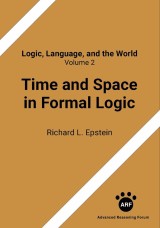Details

Time and Space in Formal Logic
Logic, Language, and the World, Band 2
|
29,99 € |
|
| Verlag: | Advanced Reasoning Forum |
| Format: | |
| Veröffentl.: | 13.09.2022 |
| ISBN/EAN: | 9781938421693 |
| Sprache: | englisch |
| Anzahl Seiten: | 303 |
DRM-geschütztes eBook, Sie benötigen z.B. Adobe Digital Editions und eine Adobe ID zum Lesen.
Beschreibungen
Time and Space in Formal Logic begins with an analysis of assumptions about how logic and language relate. Then in the first section, times are taken to be established by true propositions, and those are related as before and after with temporal propositional connectives. In the second section, times are treated as things that can be picked out and counted, leading to a predicate logic that allows for quantification over times. In the third section, locations in space are also treated as things that can be picked out and counted, leading to a predicate logic that allows for quantification over both times and locations. Many applications of the formal systems to formalizing ordinary language propositions and inferences clarify better the assumptions we make in reasoning taking account of time and space by making those precise in the formal systems. Appendices on events, branching times, intentions, and descriptive names add to the scope of the work.
Preface
Logic and Language
1 Propositions and Inferences
2 Logic and Language
Temporal Propositional Connectives
3 Times and Propositions
4 Temporal Connectives
5 Time as an Ordering
6 Classical Propositional Logic witt Temporal
Connectives
7 Reduced Models
8 An Axiom System
9 Examples of Formalizing
10 Other Orderings of Time
11 Past, Present, and Future
Quantifying over Relative Times
12 Quantifying over Relative Times via Indices
13 Examples of Formalizing
Time in Predicate Logic
14 The Timelessness of Classical Predicate
Logic
15 Time and Reference in Predicate Logic
16 Times as Things
17 Basic Assumptions about Time
18 Times and Predications
19 Identity and the Equality Predicate
20 When Things Exist
21 The Logic QT
22 Examples of Formalizing: The Nature
of Time
23 The Internal Structure of Atomic Predicates
Formalizing with Quantifying over Times
24 Quasi-Linear Time
25 Formalizing English Tenses
26 Examples of Formalizing: Context of
Utterance and Tenses
27 Examples of Formalizing: Existence
28 Examples of Formalizing: Attributes
29 Relativizing Quantifiers
30 Examples of Formalizing: Meaning Axioms
31 Examples of Formalizing: How Many Times
32 Examples of Formalizing: The Internal
Structure of Predicates and Names
33 Measuring Time?
34 Other Tenses
35 The Habitual
Space in Predicate Logic
36 Things in Time and Space
37 Locations
38 References to Things, Times, and Locations
Are Independent
39 Assumptions about Locations
40 True in a Location
41 Locational Predicates
42 Existence in Space and Time
43 Where Things Are
44 A Formal Logic
45 Semantics
46 An Axiom System
47 Examples of Formalizing: The Nature
of Space
48 Informal Examples
49 Examples of Formalizing
50 Location-Orienting Predicates
51 Parts of Physical Things
Metaphysical Bases of Logics of Time and Space
Appendices
Tenses as Propositional Operators
The Tapestry of Time
Events
Intentions
Descriptive Names
Bibliography
Index of Examples
Index of Notation
Index
Logic and Language
1 Propositions and Inferences
2 Logic and Language
Temporal Propositional Connectives
3 Times and Propositions
4 Temporal Connectives
5 Time as an Ordering
6 Classical Propositional Logic witt Temporal
Connectives
7 Reduced Models
8 An Axiom System
9 Examples of Formalizing
10 Other Orderings of Time
11 Past, Present, and Future
Quantifying over Relative Times
12 Quantifying over Relative Times via Indices
13 Examples of Formalizing
Time in Predicate Logic
14 The Timelessness of Classical Predicate
Logic
15 Time and Reference in Predicate Logic
16 Times as Things
17 Basic Assumptions about Time
18 Times and Predications
19 Identity and the Equality Predicate
20 When Things Exist
21 The Logic QT
22 Examples of Formalizing: The Nature
of Time
23 The Internal Structure of Atomic Predicates
Formalizing with Quantifying over Times
24 Quasi-Linear Time
25 Formalizing English Tenses
26 Examples of Formalizing: Context of
Utterance and Tenses
27 Examples of Formalizing: Existence
28 Examples of Formalizing: Attributes
29 Relativizing Quantifiers
30 Examples of Formalizing: Meaning Axioms
31 Examples of Formalizing: How Many Times
32 Examples of Formalizing: The Internal
Structure of Predicates and Names
33 Measuring Time?
34 Other Tenses
35 The Habitual
Space in Predicate Logic
36 Things in Time and Space
37 Locations
38 References to Things, Times, and Locations
Are Independent
39 Assumptions about Locations
40 True in a Location
41 Locational Predicates
42 Existence in Space and Time
43 Where Things Are
44 A Formal Logic
45 Semantics
46 An Axiom System
47 Examples of Formalizing: The Nature
of Space
48 Informal Examples
49 Examples of Formalizing
50 Location-Orienting Predicates
51 Parts of Physical Things
Metaphysical Bases of Logics of Time and Space
Appendices
Tenses as Propositional Operators
The Tapestry of Time
Events
Intentions
Descriptive Names
Bibliography
Index of Examples
Index of Notation
Index
Richard L. Epstein is the author of Computability (with Walter Carnielli), the series The Semantic Foundations of Logic (Propositional Logics, Predicate Logic, Classical Mathematical Logic), the series Logic as the Art of Reasoning Well, and this current series Logic, Language, and the World (An Introduction to Formal Logic, The Internal Structure of Predicates and Names). He is currently the Head of the Advanced Reasoning Forum.
Diese Produkte könnten Sie auch interessieren:

Ethik in der Medizin. Abwägung von Risiko und Nutzen bei experimentellen Behandlungen

von: Mercan Karadag

5,99 €

Lob der Wiederentdeckung

von: Ina Braun-Yousefi, Manfred Moßmann, Sophie Lange, André Uzulis, Siegfried Flaspoehler

30,00 €














